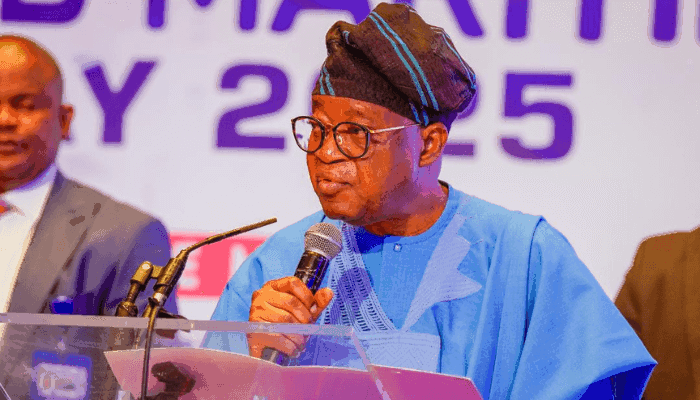841
By Daniel Adaji
Minister of Marine and Blue Economy, Adegboyega Oyetola has pledged to strengthen maritime governance, enhance regional cooperation, and ensure safer and cleaner waters across West and Central Africa.
He made this commitment at the 3rd Bureau of Ministers Meeting of the Abuja Memorandum of Understanding (Abuja MoU) on Port State Control held in Conakry, Republic of Guinea.
Speaking at the regional forum, Oyetola reaffirmed Nigeria’s commitment to enforcing port state control, protecting the marine environment, and aligning the nation’s maritime operations with international standards.
In a statement on Saturday, he said Nigeria would continue to support the objectives of the Abuja MoU, which provides a cooperative framework for maritime safety and the elimination of substandard vessels in African waters.
“Nigeria remains unwavering in its support for the objectives of the Abuja MoU. We have taken concrete steps to improve our maritime administration, including the enforcement of port state control and the removal of substandard vessels from our waters,” the minister said.
He commended the Government and people of Guinea for hosting the 15th Port State Control Committee Meeting, which concluded prior to the ministerial session. He described the meeting’s technical deliberations as “valuable insights into the challenges and opportunities” facing port state control in the region.
A major highlight of Oyetola’s statement was the recent approval of Nigeria’s National Policy on Marine and Blue Economy by the Federal Executive Council (FEC). The policy, he said, establishes a comprehensive framework for safer, cleaner, and more sustainable maritime operations consistent with the ideals of the Abuja MoU and global best practices.
According to him, the new policy underscores Nigeria’s resolve to build a thriving blue economy that fosters economic growth while safeguarding ocean health, promoting job creation, and enhancing maritime safety.
“The policy demonstrates Nigeria’s determination to build a thriving blue economy that balances economic growth with ocean health, job creation, and maritime safety,” he explained.
Oyetola urged member states of the Abuja MoU to strengthen enforcement mechanisms in their jurisdictions and support the institutional resilience of the MoU Secretariat.
He warned against allowing the region to become “a dumping ground for substandard vessels,” stressing that weak compliance could result in accidents with grave implications for national, regional, and global maritime security.
He emphasizlsed that effective port state control is fundamental to unlocking the full potential of the blue economy, especially in a region where most ships calling at ports are foreign-flagged.
“The Abuja MoU must continue to act as a catalyst for safer shipping practices, stronger compliance, and deeper technical cooperation among member states,” he said.
Oyetola added that the Bureau of Ministers would review and endorse the outcomes of the 15th Port State Control Committee Meeting to empower maritime officers in the discharge of their statutory duties.
Reiterating Nigeria’s readiness to share expertise and collaborate with regional partners, he called for increased financial commitments by member states to sustain the Abuja MoU Secretariat’s efficiency. He noted that these contributions were crucial to maintaining the Secretariat’s capacity to coordinate regional efforts effectively.
As part of Nigeria’s broader maritime diplomacy, the minister also sought support for Nigeria’s candidature in the forthcoming International Maritime Organization (IMO) Council elections under Category C.
The minister said Nigeria’s inclusion on the Council would help amplify Africa’s collective voice in global maritime governance and advance the goals of the Abuja MoU.
The Abuja MoU, established in 1999, is a regional agreement among 20 West and Central African countries aimed at promoting maritime safety, protecting the marine environment, and ensuring that ships operating in the region comply with international standards.
The Conakry meeting brought together ministers, maritime administrators, and technical experts from across the region to review implementation progress, strengthen institutional cooperation, and outline strategies for safer regional waters.



